Trans Rights Protest: Activists campaign for trans and non-binary rights
Government urged to act as people face waiting lists of up to five years for gender clinic appointments
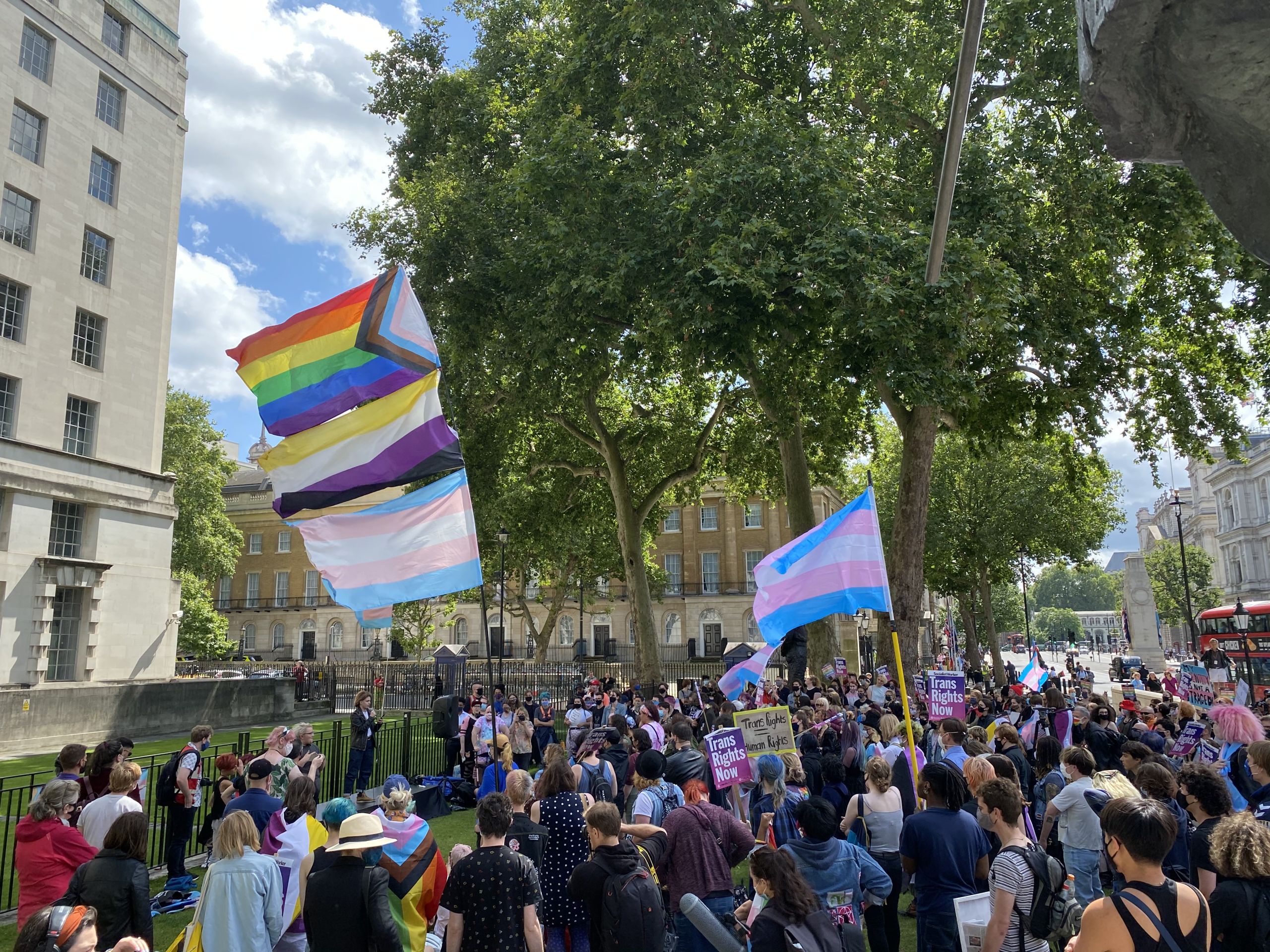
Activists staged a protest outside Downing Street last week to campaign for trans and non-binary rights.
Organised by Laura Kate Dale and Felix Fern, the protest raised awareness for issues facing the trans and non-binary community, including access to healthcare.
Speaking at the protest, Felix (he/they), 32, said: “We feel like we are at more risk than we have ever been before and we’re concerned that that’s only going to get worse, so we’re here to do something about it."
Felix said the healthcare system needs to be completely reformed and hopes to see reduced waiting times, better funding, and an increased focus on GP-led healthcare so transgender people can be supported locally.
How long are the waiting lists for treatment?
Transgender people face waiting times of between three and five years for a first appointment at a gender clinic, Laura said.
Recent figures show 2,702 people were on the waiting list for The Laurels in Exeter, one of England’s seven adult gender clinics, and in April 2021 they were treating people who were referred in 2016.
This five-year waiting time is more than 15 times the NHS target waiting time of 18 weeks for consultant-led treatments.
Speaking outside Downing Street, Laura (she/her), 29, said: “Currently for trans healthcare in the UK, the waiting times are ridiculous, they are unfathomable, they are not acceptable.
“Waiting times for healthcare are getting worse and worse, and the government does not seem to care - it doesn’t seem to think that this is a problem.”
Earlier this year, the Care Quality Commission (CQC) called for improved waiting times at Tavistock and Portman NHS Foundation Trust - England’s only youth gender identity service - after inspectors found that more than 4,600 young people were waiting up to two years for a first appointment.
The CQC also found that staff caseloads were high, and many of the young people waiting for or receiving a service were vulnerable and at risk of self-harm, but the size of the waiting list meant staff couldn’t “proactively manage the risks” to patients waiting for a first appointment.
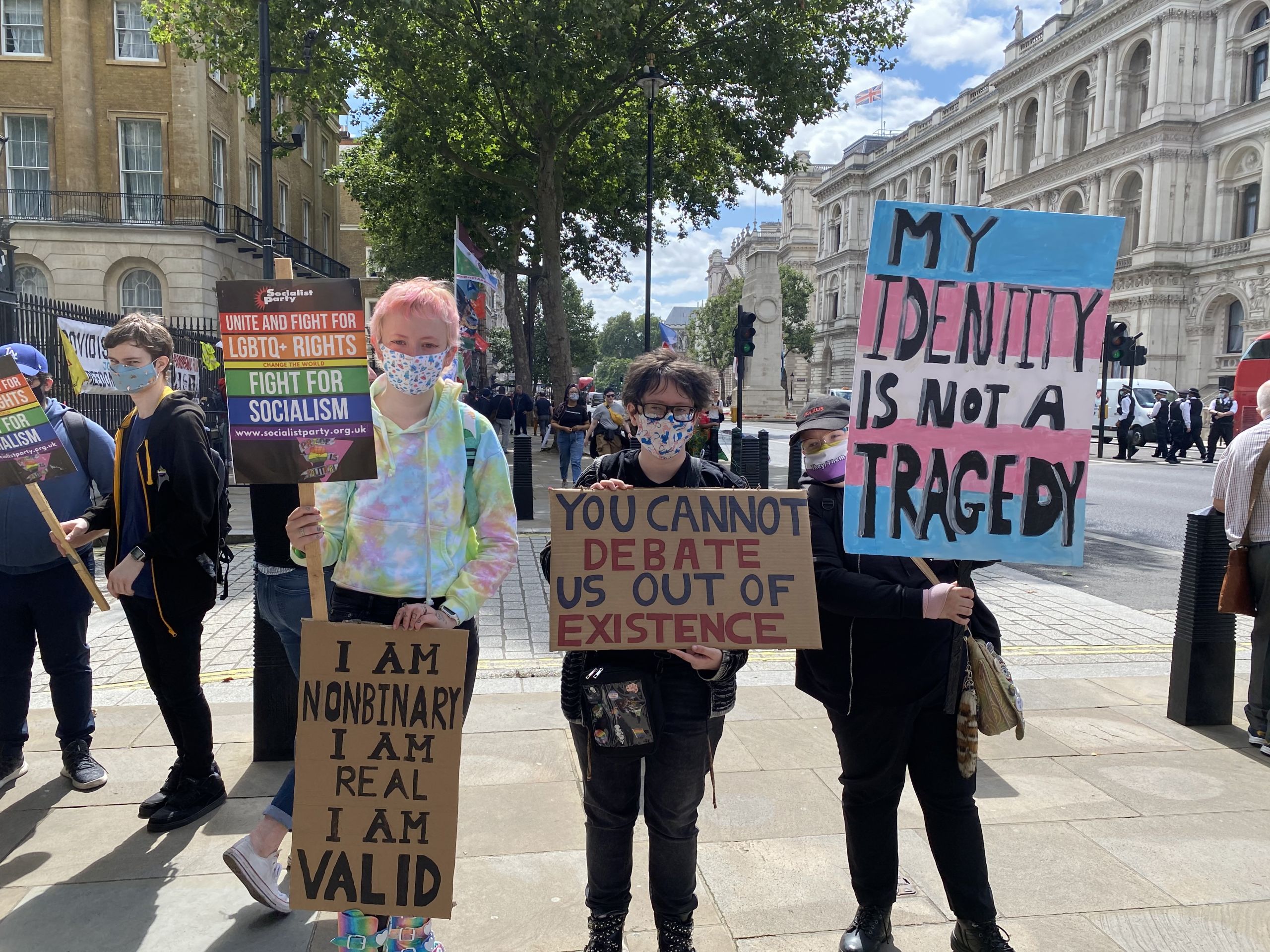
Jackdaw, Nova, and Jay holding placards at Friday's demonstration. Image: Elaine McCallig
Jackdaw, Nova, and Jay holding placards at Friday's demonstration. Image: Elaine McCallig
What does the 2004 Gender Recognition Act mean for trans and non-binary people?
Protesters also called for the Gender Recognition Act to be reformed.
Introduced in 2004, the legislation sets out how people aged over 18 can receive legal recognition of their gender, with successful applicants receiving a Gender Recognition Certificate (GRC).
However, people must meet certain criteria - such as having a diagnosis of gender dysphoria - for their application to be approved by a Gender Recognition Panel.
In 2018 the government launched a consultation to reform the “bureaucratic and invasive” process of changing genders legally, with a view to demedicalising the process.
The majority of respondents were in favour of reforming the act by liberalising the requirements.
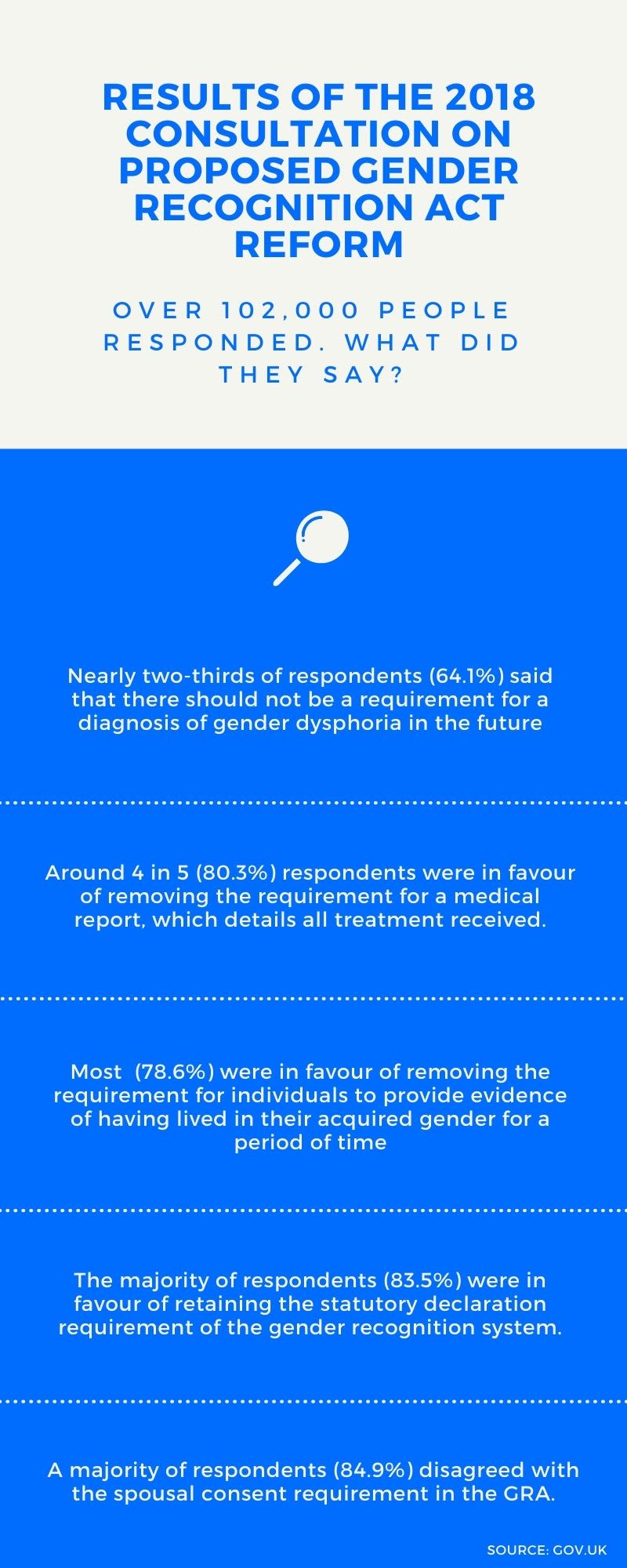
Despite the results of the consultation process, in 2020 equalities minister Liz Truss said: “It is my view that the balance struck in the existing legislation is correct.”
As a result, the only way the process has changed for those applying for a Gender Recognition Certificate is that they can do so online, and the fee has been reduced from £140 to £5.
3/3 Following today’s announcement, this is what people will need to apply for a Gender Recognition Certificate ⬇️
— Government Equalities Office (@GEOgovuk) September 22, 2020
Find out more https://t.co/E2n2dYuxvA pic.twitter.com/ZPEnHhW8Au
Stonewall Chief Executive Nancy Kelley said this lack of reform was a “missed opportunity” to progress equality.
At the protest, Laura commented: “[Liz Truss’] perspective on the trans community is constantly counter to both what the general public as well as the trans community have been vocal about.
“What we need is firm commitment from the government, particularly from Liz Truss that things are going to improve, that they’re going to listen to the trans community on matters of trans importance.”
A 2021 petition which called on the government to make non-binary a legally recognised gender identity in the UK received almost 140,000 signatures. It was met with a response from the government that said if provision were to be made for non-binary gender recognition in the GRA, there would be “complex practical consequences for other areas of the law, service provision and public life”.
The move towards banning conversion therapy
Although the Gender Recognition Act has not been reformed in any major way, a positive step the government has taken towards wider LGBT+ rights has been the promise of ushering in legislation that would ban conversion therapy.
The forthcoming ban would cover abhorrent practices that seek to change someone’s sexual orientation and/or gender identity and would be introduced following a “short consultation”.
According to the government, the consultation will seek further views from the public and stakeholders to ensure that the ban can address the practice while protecting “the medical profession, defending freedom of speech, and upholding religious freedom.”
New funding will also be made available to increase the support available for victims of conversion therapy, the first time a government has offered this in the UK.
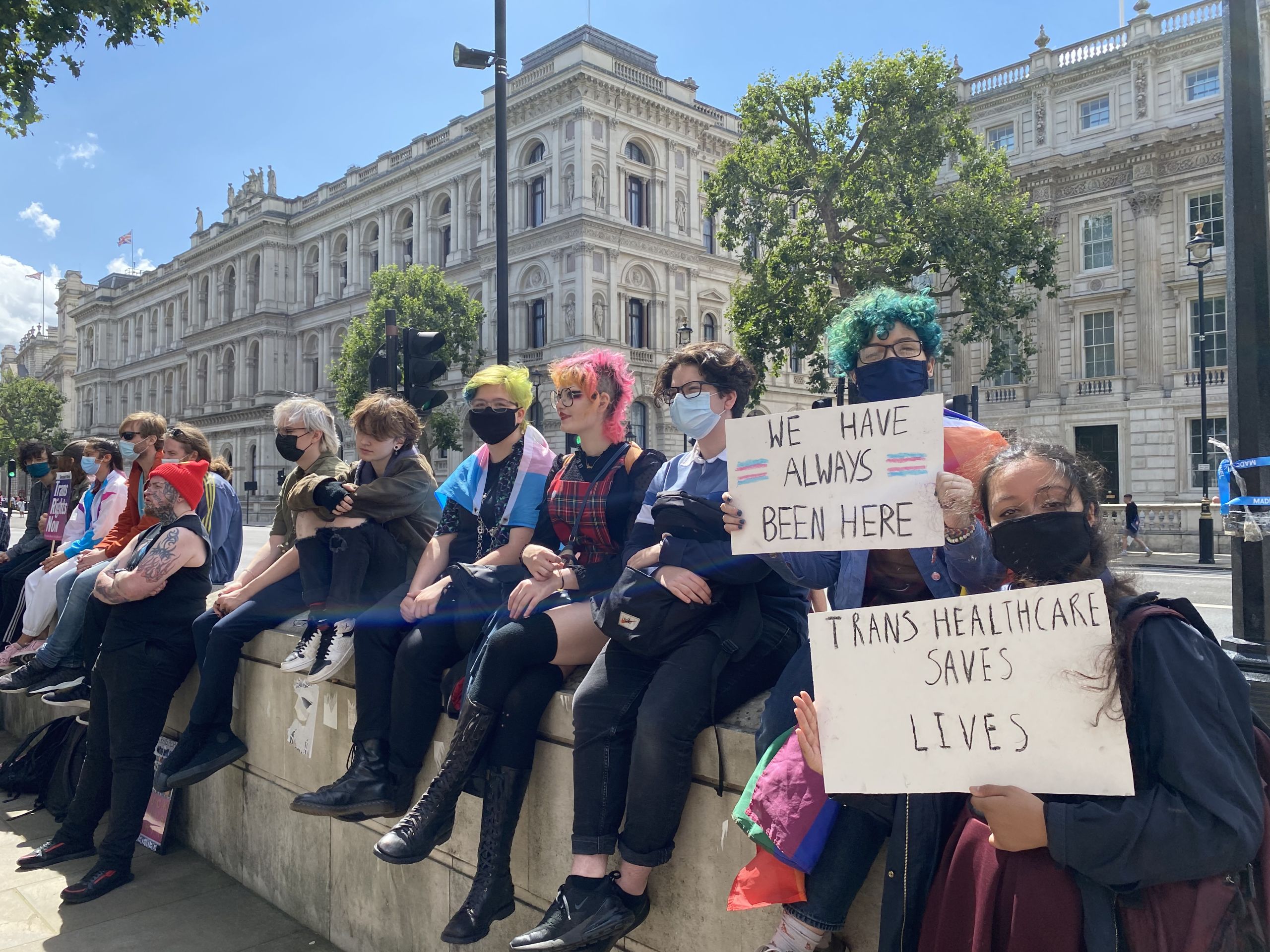
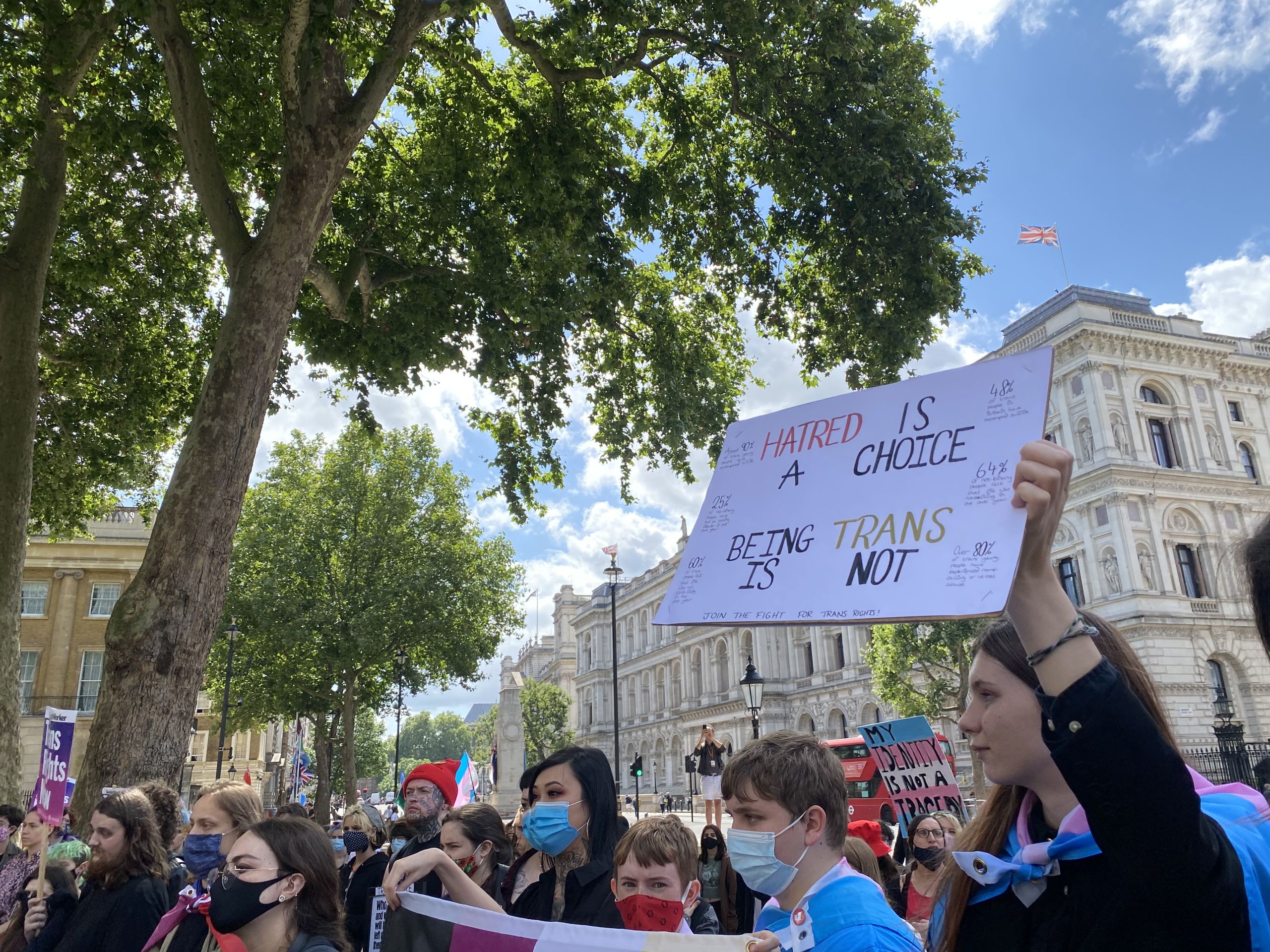
How widespread is trans discrimination in the UK?
Recorded transphobic hate crime has tripled between 2015/2016 and 2019/2020 according to Home Office statistics.
A 2020 report from Galop, the UK’s LGBT+ anti-abuse charity, revealed that four in five respondents had experienced a form of transphobic hate crime in the 12 months leading up to the survey.
Just 14% of respondents reported their experience to the police, with more than seven in ten people feeling the police could not help them.
In a statement accompanying the report, Galop Chief Executive Leni Morris said: “LGBT+ hate crime is disproportionately on the rise in the UK, and this new report shows the reality of life, right now, for British trans people. As the whole LGBT+ community knows from our history, there are real-world consequences to public debates, and our new report shows how trans victims of assault and abuse are being left behind.”
Speaking on Friday, Laura said: “Trans people just want to quietly be who we are and get on with living joyous, lovely and peaceful lives.
"None of us are happy we have to be here today shouting for our rights but we’re doing it because we want to get to a future where we can just simply exist.”
Protester Helen Pattison said: “Coming together and showing that we will be a force to stand up to the Tory government is extremely important so this might have been just be one step, but it’s an important one.”
As the government dithers, people are suffering - not just in terms of healthcare and legal recognition - but in the street, online, in the workplace, and at home.
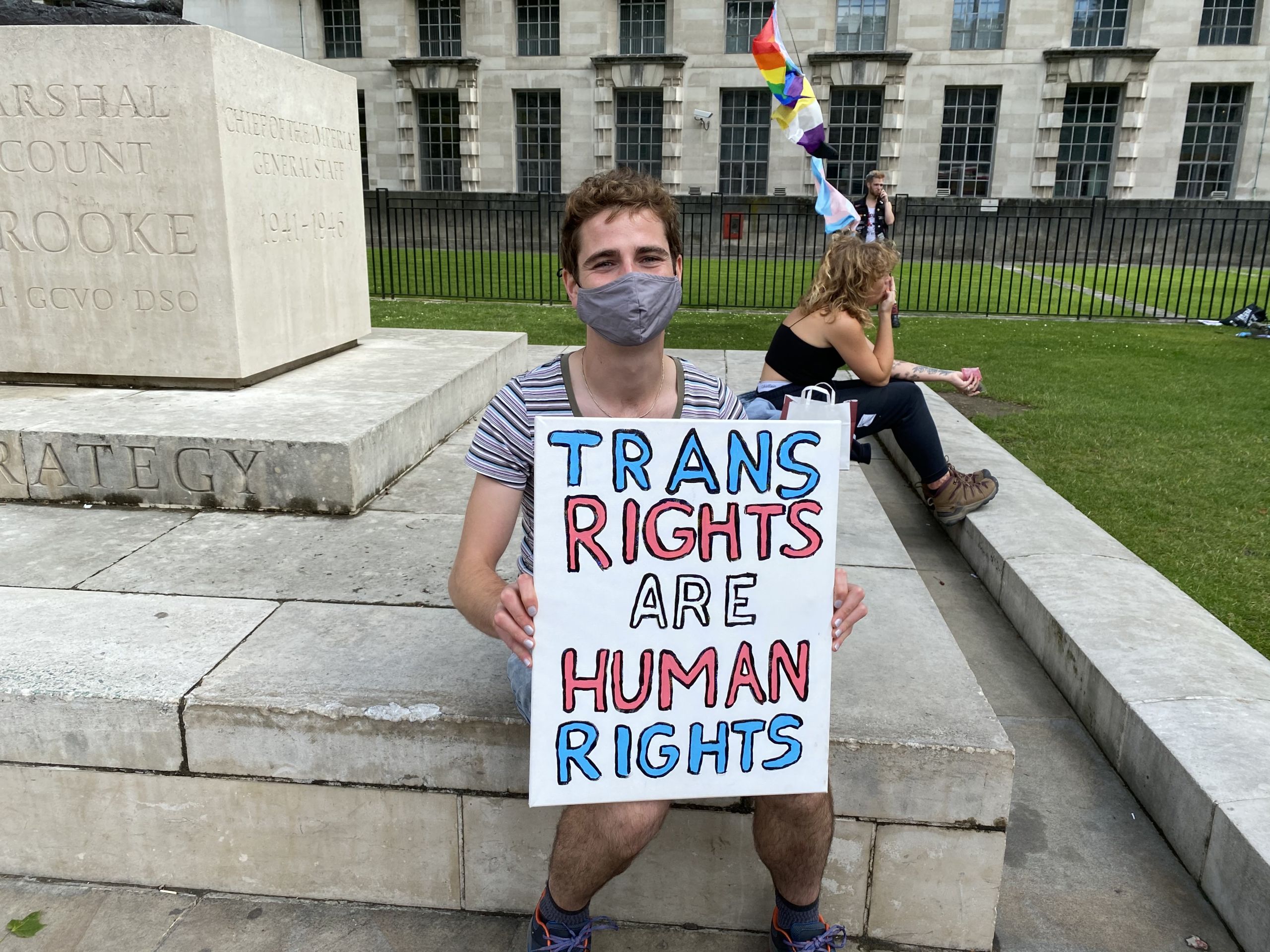
Sam with a placard reading: "Trans rights are human rights"
Sam with a placard reading: "Trans rights are human rights"
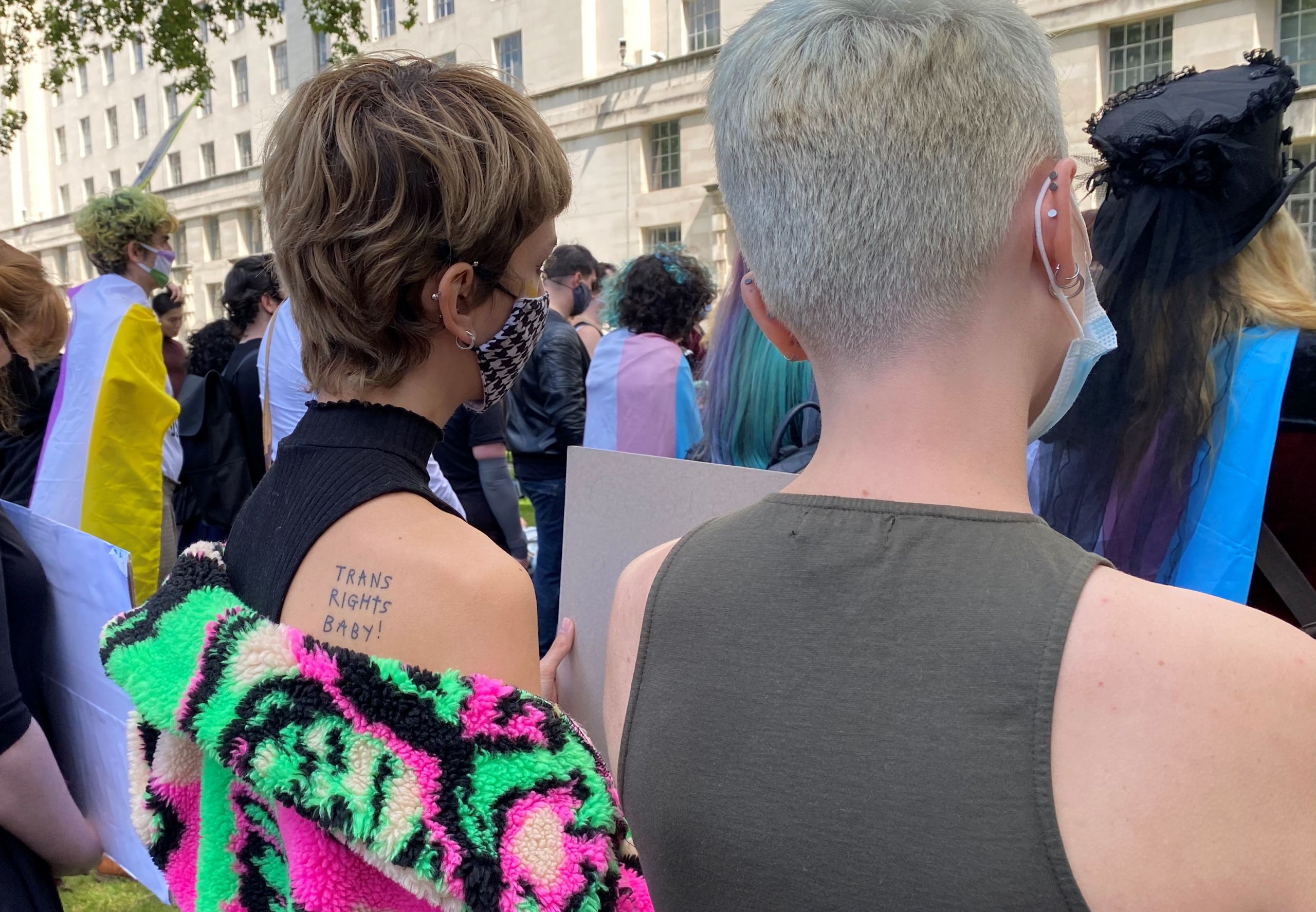
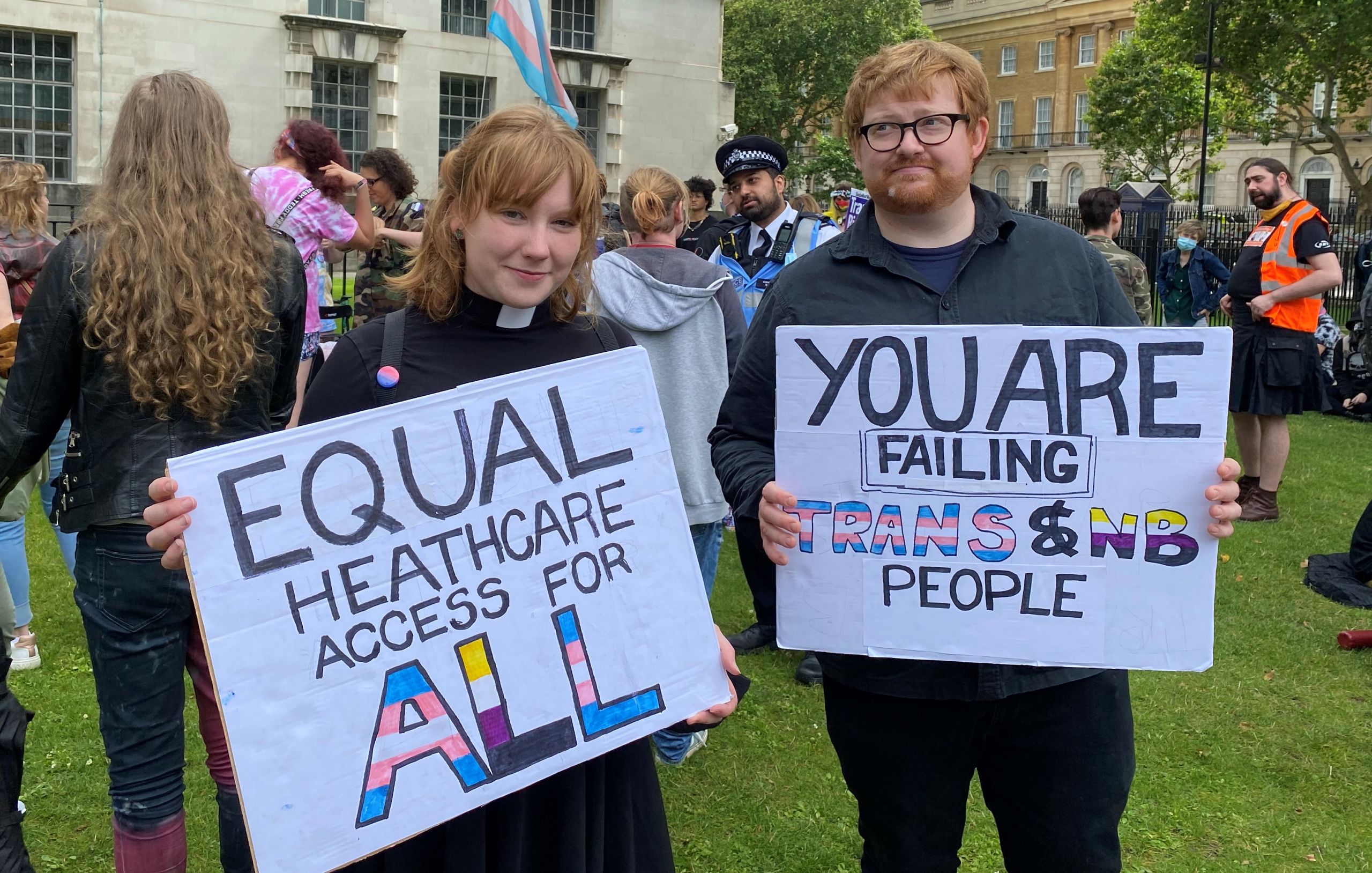
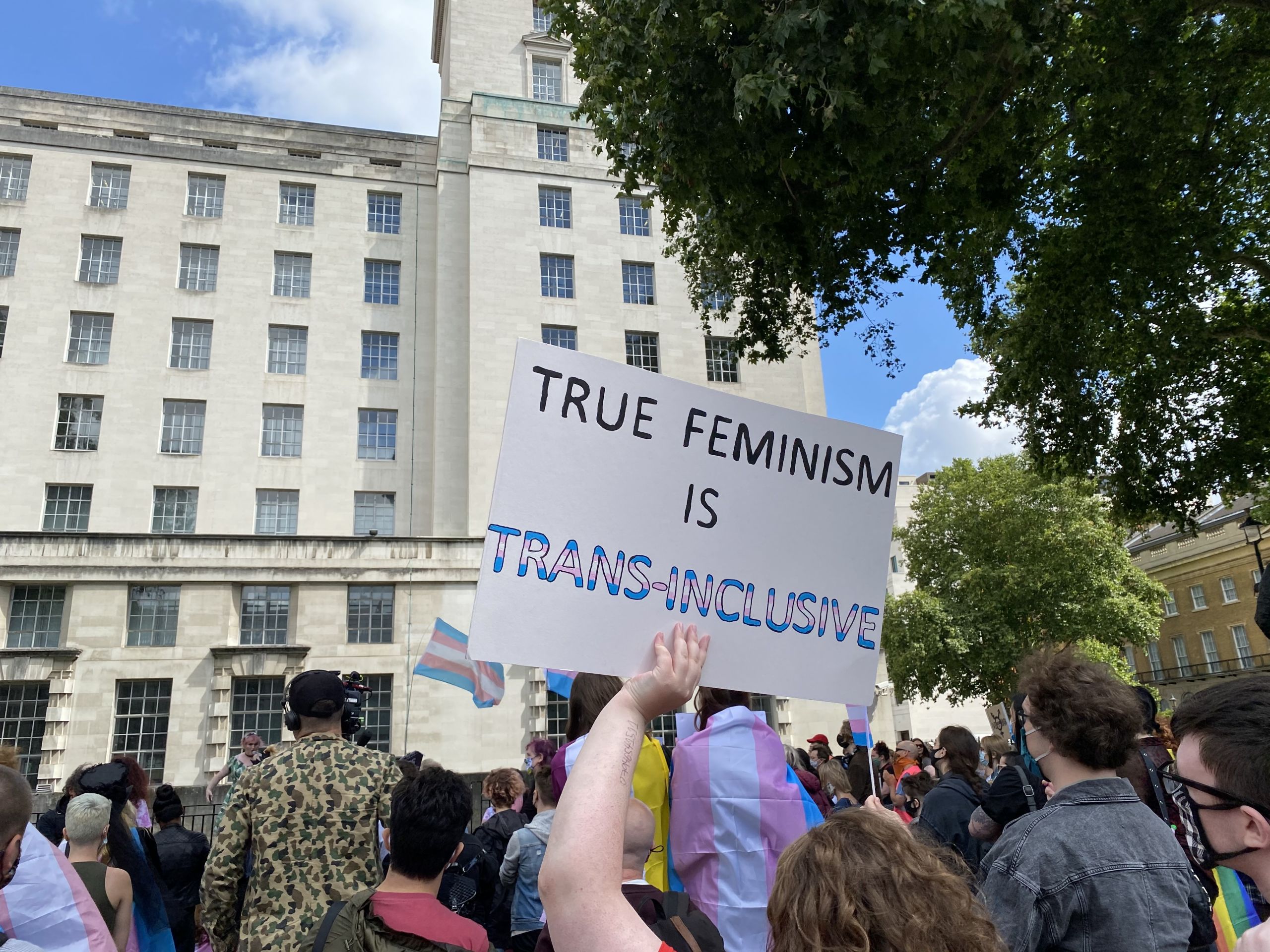
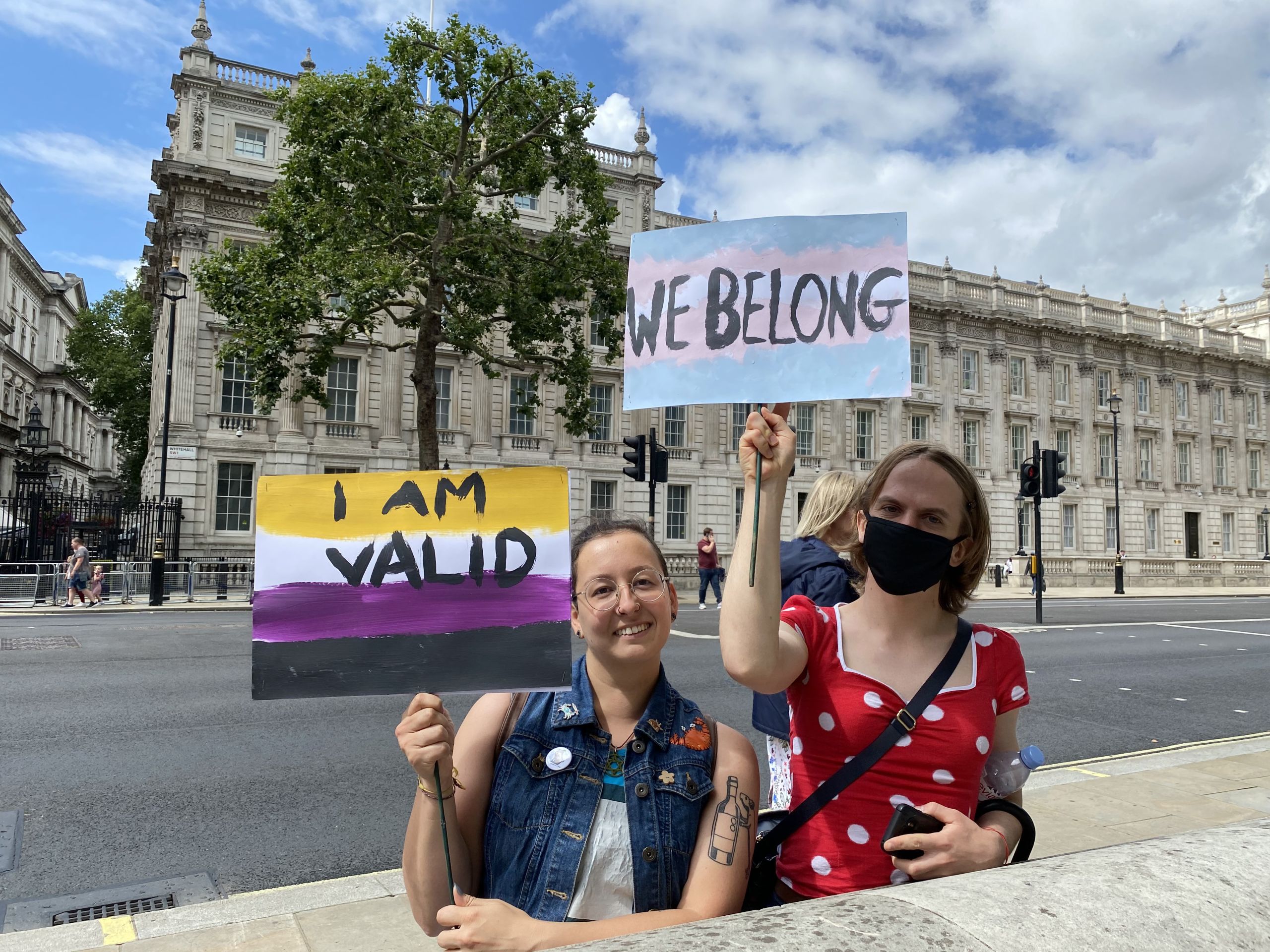

A protester with a tattoo reading "Trans rights baby!"
A protester with a tattoo reading "Trans rights baby!"

Charlie and Andy Smith holding signs reading: "Equal healthcare access for all", and "You are failing trans and NB people"
Charlie and Andy Smith holding signs reading: "Equal healthcare access for all", and "You are failing trans and NB people"

A sign reading: "True feminism is trans-inclusive"
A sign reading: "True feminism is trans-inclusive"

Lorelei and Nik holding "I am valid" and "We belong" signs
Lorelei and Nik holding "I am valid" and "We belong" signs
A number of high-profile activists addressed the hundreds-strong crowd, including Fox Fisher, a non-binary trans writer and filmmaker as well as renowned writer Roz Kaveney.
Other speakers included Rico Jacob Chace, Kathryn Bristow, Sophie McAllister, Kate Gee, Siân Amekuedi, James Sunderland, Ramses Oliva, Charlie Caine, Chris Jae Vanjie, and Maryam Din.
Keynote speeches were made by organisers Laura and Felix.
All speeches were recorded and can be accessed on YouTube.
In a statement to the SW Londoner, a Government Equality Hub spokesperson said: “The UK is a global leader on LGBT rights, this government remains committed to ensuring the UK is a safe and fair place for everyone to live.
"We want to make sure that people in this country are protected. We have repeatedly confirmed we will be banning the abhorrent practice of conversion therapy and that this ban will cover both sexual orientation and gender identity.
"The government has also made clear that the balance struck in the current legislative system is correct to allow people to change their legal sex, and there are no plans to alter the GRA."
